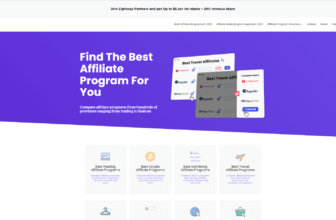
Affiliate Marketing and PPC: How to Make it Profitable
Introduction:
Affiliate marketing is a popular way to monetise a website or blog by promoting products or services and earning a commission on each sale. However, in today’s highly competitive digital landscape, simply setting up an affiliate program and waiting for sales to roll in is not enough. To succeed in affiliate marketing, you need to combine it with pay-per-click (PPC) advertising, a powerful and efficient way to drive targeted traffic to your site. In this article, we will show you how to use affiliate marketing and PPC advertising together to make your website profitable.
Understanding Affiliate Marketing
Affiliate marketing is a type of performance-based marketing where a company pays a commission to an affiliate for each sale or lead generated from their referral. The affiliate earns a commission by promoting the company’s products or services to their audience using a unique tracking link that is provided by the company. When a user clicks on the link and makes a purchase, the affiliate earns a commission on that sale.
There are several types of affiliate marketing programs, including:
Pay-Per-Sale (PPS): The most common type of affiliate program where the affiliate earns a commission for each sale they refer to the company.
Pay-Per-Lead (PPL): In this type of affiliate program, the affiliate earns a commission for each lead they refer to the company, such as a form fill or sign-up.
Pay-Per-Click (PPC): This type of affiliate program pays the affiliate for each click they generate on their unique tracking link, regardless of whether the user makes a purchase or not.
Here are some examples of affiliate programs across gambling, trading and crypto:
To succeed in affiliate marketing, you need to have a strong understanding of your audience and their needs. You also need to choose the right products or services to promote that are relevant to your audience and align with your brand. By selecting high-quality products or services, you can build trust with your audience and increase the likelihood of them making a purchase through your affiliate link.
Using PPC Advertising to Boost Your Affiliate Marketing
Pay-per-click (PPC) advertising is a form of digital marketing where advertisers pay each time their ad is clicked on. PPC ads appear at the top and bottom of search engine results pages and can also appear on websites and social media platforms. By combining PPC advertising with affiliate marketing, you can drive targeted traffic to your site and increase the likelihood of generating sales and earning commissions.
Keyword Research
To create a successful PPC campaign, you need to conduct thorough keyword research to identify the keywords and phrases that your target audience is searching for. You can use keyword research tools like Google Keyword Planner, SEMrush, or Ahrefs to find relevant keywords and estimate their search volume and competition level. By targeting high-intent keywords related to your niche, you can attract users who are more likely to convert into customers.
Ad Copy
Your ad copy is the text that appears in your PPC ads and is the first impression users have of your brand. To create effective ad copy, you need to craft compelling headlines and descriptions that include your target keywords and clearly communicate the benefits of your product or service. You can also use ad extensions like sitelinks, callouts, and reviews to provide additional information and encourage users to click on your ad.
Landing Pages
Once a user clicks on your PPC ad, they will be directed to a landing page on your website. Your landing page should be optimised for conversion and provide a seamless user experience. It should also include relevant and engaging content that aligns with your ad copy and clearly communicates the value of your product or service. By designing high-converting landing pages, you can maximise the ROI of your PPC advertising and increase the likelihood of generating sales through your affiliate program.
Using Data to Optimise Your Affiliate Marketing and PPC Campaigns
When it comes to making your affiliate marketing and PPC campaigns profitable, data is your best friend. By tracking and analysing the right metrics, you can make informed decisions about where to allocate your budget and how to optimise your campaigns for maximum ROI.
Some of the key metrics to track include click-through rates, conversion rates, cost per click, and cost per conversion. You can use this data to identify which keywords, ad copy, and landing pages are driving the most traffic and conversions, and then optimise your campaigns accordingly.
For example, if you notice that certain keywords are generating a lot of clicks but few conversions, you may need to adjust your ad copy or landing page to better align with user intent. Or, if you find that a particular ad is underperforming, you could try testing different variations to see if you can improve its click-through rate and conversion rate.
In addition to these basic metrics, you can also use more advanced analytics tools to gain deeper insights into user behaviour and identify new opportunities for optimization. For example, you could use heatmaps to see where users are clicking on your landing pages, or use A/B testing to compare different versions of your ads and landing pages.
By taking a data-driven approach to your affiliate marketing and PPC campaigns, you can continually refine your strategy and make incremental improvements that add up to significant gains in profitability over time.
Conclusion
Combining affiliate marketing with pay-per-click (PPC) advertising can be a highly effective way to increase revenue and profits. By carefully selecting the right affiliate programs and products, conducting thorough keyword research and ad targeting, and constantly testing and optimising your campaigns, you can achieve significant ROI and a strong competitive edge in your market.
However, it is important to keep in mind that successful affiliate marketing and PPC require a significant investment of time, effort, and resources. It is crucial to continually monitor your campaigns, track your performance metrics, and make adjustments as needed to ensure the best possible results.
The key to making affiliate marketing and PPC profitable is to approach them as complementary strategies, rather than as separate and distinct channels. By leveraging the strengths of both approaches, you can create a powerful and sustainable revenue stream for your business.
- A Full Guide to The Adidas Affiliate Program - 23 July 2024
- Louis Vuitton Affiliate Program Alternatives: 8 High-End Fashion Affiliate Programs - 16 July 2024
- Discover the Power of MioMedia’s Affiliate Program - 16 July 2024








